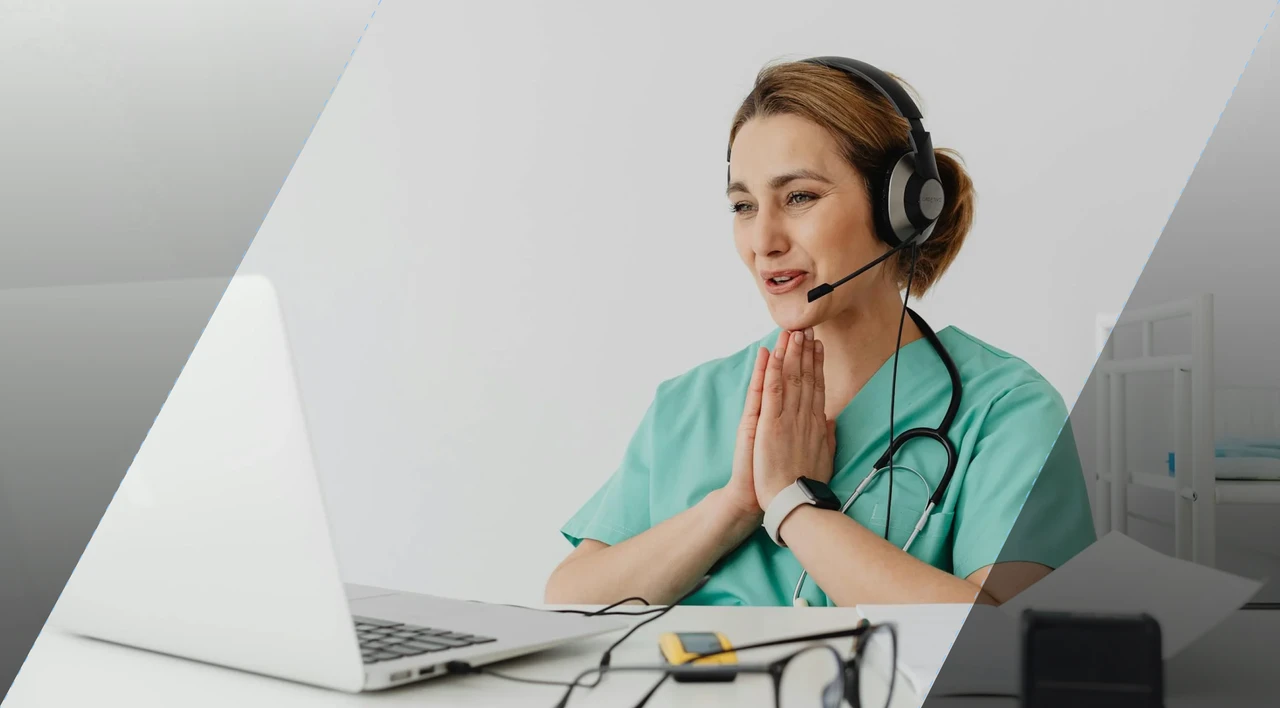SHARE
Health App Development Insights in 2025

Contents
Contents
mHealth apps, or mobile health applications, are software programs on mobile devices that leverage advanced technologies to empower users with tools for health monitoring, medical information access, virtual consultations, and personalized wellness management, revolutionizing healthcare delivery and facilitating proactive health management anytime, anywhere.
In this blog, we will explore expert insights on mHealth app development, including the types of mobile health applications, their impact on the healthcare industry, and the increased demand for outsourcing the development of health apps.
Key Takeaways:
- Understanding user requirements is crucial in mHealth app development.
- mHealth technology solutions can address challenges in traditional healthcare.
- Advancements in technology have paved the way for better healthcare outcomes through mobile apps.
- Expert insights shed light on the potential of mHealth app development in the healthcare industry.
The Market for mHealth Apps
According to research, the global market for mHealth apps was valued at USD 43.5 billion in 2022 and is projected to grow at a CAGR of 11.6% from 2023 to 2030. This growth is driven by factors such as the increasing adoption of fitness and medical apps, the penetration of smartphones and the internet, and the growing awareness of the importance of maintaining physical health. Healthcare professionals believe that mobile health applications can improve patients’ health, leading to increased demand for mHealth applications. However, concerns regarding data security and privacy, as well as the need for regulatory approval, can impede market expansion.
|
Factors Driving Market Growth |
Factors Limiting Market Expansion |
|
|
Types of mHealth Apps
mHealth apps play a vital role in transforming healthcare, offering a range of solutions for both healthcare providers and patients. These healthcare mobile apps can be classified into two main categories: professional solutions and apps for patients.
Professional Solutions
Professional solutions are specifically designed to support healthcare professionals in their daily tasks, communication, and decision-making processes. These apps provide a range of features and capabilities that enhance patient care and streamline workflow. Some notable features of professional mHealth apps include:
- Electronic health record integration: Ensuring seamless access to patient information and medical history.
- Secure messaging: Facilitating quick and secure communication between healthcare professionals.
- Telemedicine capabilities: Enabling remote consultations and virtual healthcare services.
- Clinical decision support systems: Assisting healthcare providers in making informed decisions based on patient data and medical guidelines.
Apps for Patients
On the other hand, apps for patients empower individuals to take control of their own health management and become actively involved in their healthcare journeys. These mobile healthcare apps provide a range of functionalities to improve patient engagement and facilitate self-care. Key features found in apps for patients include:
- Personalized health insights: Offering tailored health recommendations and insights based on individual health data.
- Medication reminders: Helping patients adhere to their prescribed medication schedules.
- Symptom tracking: Allowing users to record and monitor their symptoms to identify patterns and triggers.
- Access to medical records: Providing convenient access to medical records, test results, and other relevant health information.
- Appointment scheduling: Enabling users to easily schedule and manage their healthcare appointments.
These mHealth apps contribute to enhancing patient care, improving healthcare outcomes, and empowering individuals to actively participate in their own well-being.
|
Professional Solutions |
Apps for Patients |
|
Electronic health record integration |
Personalized health insights |
|
Secure messaging |
Medication reminders |
|
Telemedicine capabilities |
Symptom tracking |
|
Clinical decision support systems |
Access to medical records |
|
Appointment scheduling |
Impact of mHealth Apps on Patients and Healthcare
mHealth apps have revolutionized healthcare delivery by leveraging technology to enhance patient care and streamline administrative tasks. These apps have made a significant impact in various areas, including telemedicine, EHR integration, diagnostic tools, medication management, and medical billing.
Telemedicine
The rise of mHealth apps has led to the increased popularity of telemedicine, allowing patients to schedule virtual appointments and connect with healthcare providers remotely. This technology has improved access to care, especially for patients in rural areas or those with limited mobility.
EHR Integration
mHealth apps with electronic health record (EHR) integration have transformed the way healthcare providers access and update patient records. This seamless integration has led to improved coordination of care and a reduction in errors due to outdated or incomplete information.
Diagnostic Tools
mHealth apps equipped with diagnostic tools have empowered healthcare providers with the ability to make accurate diagnoses. These tools aid in early detection of diseases and improve patient outcomes by enabling timely and effective treatment.
Medication Management
mHealth apps play a crucial role in medication management, ensuring patients take their medications as prescribed. These apps provide medication reminders, track adherence, and offer personalized insights, ultimately improving patient safety and adherence to treatment plans.
Medical Billing
mHealth apps have simplified medical billing and revenue cycle management, reducing the administrative burden on healthcare providers. These apps streamline the billing process, improve accuracy, and enhance overall efficiency in financial operations.
|
Area |
Impact |
|
Telemedicine |
Improved access to healthcare services, particularly for remote or underserved populations. |
|
EHR Integration |
Enhanced coordination of care through easy access to updated patient records. |
|
Diagnostic Tools |
Accurate diagnoses, early disease detection, and improved patient outcomes. |
|
Medication Management |
Increased medication adherence, personalized insights, and improved patient safety. |
|
Medical Billing |
Streamlined administrative tasks, improved accuracy, and enhanced financial efficiency. |
Challenges in Mobile Healthcare App Development
Despite the numerous benefits of mHealth apps in the healthcare industry, there are several challenges that organizations need to address. Here are the key challenges:
Regulatory Compliance
Developing mHealth apps requires adherence to strict regulatory standards, such as HIPAA (Health Insurance Portability and Accountability Act) in the United States or similar regulations in other countries, is crucial. Ensuring data security, privacy, and compliance with healthcare laws adds complexity to the development process.
Data Security and Privacy
Healthcare apps handle sensitive patient information, making data security and privacy paramount. Implementing robust encryption, authentication, and access control mechanisms to protect patient data is a continuous challenge.
Interoperability
Ensuring that the app can seamlessly integrate with existing healthcare systems, electronic health records (EHRs), and other medical devices is a significant challenge. Achieving interoperability is crucial for the effectiveness of mHealth apps in a broader healthcare ecosystem.
Successfully navigating these challenges requires a multidisciplinary approach, involving collaboration with healthcare professionals, regulatory experts, and technology specialists throughout the development process.
Benefits of Hiring a mHealth Development Company
Engaging mHealth app developers can help mitigate many mobile health app development challenges. Here are a few key advantages of outsourcing to a healthcare software development company.
Specialized Expertise
Hiring a mHealth development team provides access to professionals with dedicated experience and knowledge in mHealth app development. These experts bring a nuanced understanding of healthcare industry intricacies, compliance requirements, and the ability to design solutions that address specific healthcare challenges.
mHealth app development services include delivering a custom app design meticulously crafted to align with the unique needs of healthcare professionals, patients, and stakeholders, ensuring a user-centric experience that enhances accessibility, usability, and overall engagement.
Cost Efficiency
One of the foremost advantages of opting for a Health development company is the potential for optimized resource allocation and cost savings compared to in-house development. These companies leverage established workflows, shared resources, and collective expertise to provide efficient solutions without the need for extensive internal investments.
Accelerated Time-to-Market
The collective experience of a professional mHealth development team facilitates faster development cycles, resulting in accelerated time-to-market for mHealth software. This agility enables organizations to promptly address evolving user needs and stay ahead of industry trends in mobile medical apps.
Enhanced Security Measures
Utilizing advanced security technologies and rigorous testing processes is a hallmark of healthcare mobile app development companies. This ensures the implementation of robust encryption, authentication, and access controls, safeguarding sensitive healthcare data and meeting stringent regulatory standards for data protection.
Trends in mHealth App Development
The field of mHealth app development is constantly evolving to meet the demands of new technology and changing patient expectations. Industry experts are focusing on creating innovative solutions that enhance healthcare experiences and improve patient outcomes. In this section, we will explore the latest trends in mHealth app development that are shaping the future of mobile health apps.
Rise of Remote Patient Monitoring (RPM) Apps
One notable trend in mHealth app development is the rise of remote patient monitoring (RPM) apps. These apps allow healthcare providers to track vital signs and monitor chronic conditions remotely, enabling more efficient and personalized care. Through RPM apps, patients can transmit their health data to healthcare professionals, who can then provide timely interventions and adjustments to treatment plans. This technology has the potential to revolutionize healthcare delivery, especially for patients with limited mobility or those living in remote areas.
Integration with Wearable Devices
mHealth apps are increasingly integrating with wearable devices such as smartwatches and fitness trackers. This integration allows users to track and monitor their health metrics in real-time, empowering them to take control of their well-being. By syncing wearable data with mobile health apps, individuals can easily monitor their heart rate, sleep patterns, activity levels, and other relevant data. This trend contributes to a more holistic and comprehensive approach to personal healthcare management.
Gamification for Engaging Health Journeys
Another exciting trend in mHealth app development is the incorporation of gamification elements. By gamifying health journeys, mobile health apps can engage users and motivate them to adopt healthy behaviors. These gamification features can include challenges, achievements, progress tracking, and rewards. By making the health journey more enjoyable and interactive, these apps encourage users to stay committed to their goals and foster long-term behavior change.
AI-Powered Diagnostics
The use of artificial intelligence (AI) in diagnostics is gaining significant traction in mHealth app development. AI algorithms can analyze medical data more efficiently and accurately, assisting healthcare professionals in making faster and more accurate diagnoses. By leveraging AI-powered diagnostics, mobile health apps can help reduce diagnostic errors, improve treatment outcomes, and enhance patient safety.
These trends in mHealth app development are driving innovation and transforming the healthcare landscape. As technology continues to advance and patient expectations evolve, we can expect even more exciting developments in the future.
Conclusion
mHealth app development is revolutionizing the healthcare industry by providing innovative solutions that improve patient care, enhance operational efficiency, and transform healthcare delivery. The integration of mobile apps in healthcare has opened up a world of possibilities, allowing patients to actively participate in managing their own health and enabling healthcare professionals to deliver personalized, patient-centric care.
With careful planning and thorough research, mHealth apps have the potential to make a significant impact on the healthcare industry. By leveraging the power of mobile technology, healthcare providers can streamline processes, improve communication, and empower patients to take control of their health.
As technology continues to advance, we can expect to see even more innovative solutions that address the evolving needs of the healthcare industry. From remote patient monitoring to AI-assisted diagnostics, the possibilities are endless. By embracing these technological advancements, healthcare providers can pave the way for a brighter and more efficient future in patient care.
Frequently Asked Questions
What is mHealth app development?
mHealth app development refers to the process of creating mobile applications specifically designed for healthcare and medical purposes.
What are the different types of healthcare apps?
Different types of healthcare apps include fitness and wellness apps, medical reference apps, medication management apps, telemedicine apps, and chronic disease management apps.
What are the key features of a healthcare mobile app?
Key features of healthcare mobile apps may include patient data management, appointment scheduling, remote consultation, medication tracking, and health tracking functionalities.
How can a mobile health app benefit users?
Mobile health apps can benefit users by providing convenient access to medical information, enabling remote monitoring, facilitating communication with healthcare providers, and promoting healthy habits through tracking and reminders.
How can a healthcare app development company help in building an app?
A healthcare app development company can provide expertise in software development, app design, regulatory compliance, and integration with health systems to ensure the successful creation of a healthcare mobile app.
What are the essential steps in the app development process for healthcare?
The essential steps in the app development process for healthcare include initial concept ideation, market research, defining user personas, wireframing and prototyping, development, testing, and deployment.
What factors determine the cost of developing a mHealth app?
Factors that determine the development cost of mHealth apps include the complexity of features, platform compatibility, regulatory requirements, design intricacy, and ongoing maintenance and support.
Expert Healthcare Software Development Services
Flatirons provides top-rated healthcare software development services.
Get the CEO's Take
Handpicked tech insights and trends from our CEO.
Expert Healthcare Software Development Services
Flatirons provides top-rated healthcare software development services.
Get the CEO's Take
Handpicked tech insights and trends from our CEO.

Record Information System (RIS) for Healthcare Data Management
Flatirons
Jul 02, 2025
Healthcare BPO Services: Streamlining Medical Operations
Flatirons
Jun 28, 2025
Patient Management System Software | Streamline Patient Care
Flatirons
May 01, 2025
CRM for Healthcare – Streamlined Patient Management
Flatirons
Jan 29, 2025
Streamline Your Healthcare Practice with EHR Integration
Flatirons
Nov 18, 2024
Top Mobile App Development Companies in California for 2025
Flatirons
Oct 29, 2024